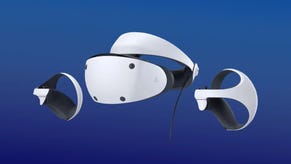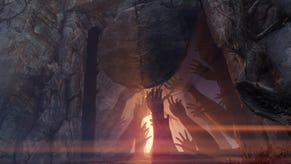Sony studio Firesprite has been shedding talent amidst accusations of toxic culture, staff say
"Death by a thousand cuts."
Sony-acquired studio Firesprite has recently suffered high profile exits amid accusations of a toxic workplace culture, Eurogamer has been told, as part of an investigation into the studio begun ahead of the layoffs announced by Sony this week.
The Liverpool-based developer released PlayStation VR2 launch title Horizon Call of the Mountain last year, after being acquired by Sony in 2021. But the impact of crunch for that game's release and changes in the company's senior leadership have subsequently led to discontent within the studio, staff have told Eurogamer - something one source described as "death by a thousand cuts".
Most concerning are reports from sources that two senior leaders from Sony support studio XDev, brought in to help lead Firesprite, have since been accused of sexual discrimination and ageism. A subsequent internal investigation by Sony is said to have resulted in the claims being dismissed as a "misunderstanding".
Job cuts at Firesprite were announced earlier this week as part of mass layoffs across Sony Interactive Entertainment. Around 900 SIE employees (equating to eight percent) will lose their jobs, though it's unclear how many at Firesprite are impacted. Bloomberg reported that the studio's live service Twisted Metal project was cancelled as a result of the job losses. Eurogamer understands the studio was also separately working on another high profile game in a Sony franchise.
Ahead of these layoffs, sources say an "alarming" number of employees had left the studio in recent months following a retention bonus payout in October, designed to reward staff for remaining on at the developer after the Sony acquisition for a further period of time.
Public employee reviews of Firesprite on company review site Glassdoor describe "horrendous" studio heads who are "way out of their depth" and "just care about their money", leading to a "toxic, bullying culture" and "culture of fear". One recent review takes a more sympathetic view, though, stating Firesprite's "old way" was disorganised and Sony has re-moulded the studio, which has "ruffled many feathers".
Eurogamer has spoken to a number of sources close to the company to understand the causes of this discontent, all of whom wished to remain anonymous for the sake of their careers. Others told us they did not wish to take part in this investigation for fear of reprisal.
While some staff say they believed change was needed at the studio after PlayStation's takeover, others suggested Sony's corporate view had altered company culture. The overall picture they painted was of a very different Firesprite to the studio that existed before the buyout.
Sony has long held a close relationship with Firesprite, which was born from the ashes of PlayStation's sadly-shuttered Studio Liverpool. The studio developed PlayStation 4 exclusive The Playroom and its later expansion, and was also behind LittleBigPlanet spin-off Run Sackboy Run. After work on several other PlayStation VR projects, Firesprite's buyout by Sony did not spark surprise.
The takeover - unknown to most staff until its public announcement - was "met with cautious positivity", one source told Eurogamer. Many employees were PlayStation fans and were excited by the news - hoping for better job security, support and other perks, while being mindful of the risk of new corporate processes not all would agree with. "I think the majority of folks saw it as either an opportunity or 'I'll stick it out'," a source said.
However, multiple events led to major changes in leadership at Firesprite. This included the sad passing of an "irreplaceable" HR leader, leaving the studio's small HR team reportedly unable to deal with managing the studio's ~300 staff, while also incorporating Sony's HR policies in the midst of the acquisition.
All but one of the original Firesprite founders have now left the company over the past year. "The last of what made Firesprite a good place to work went with them," one source told Eurogamer. Sources we spoke to remain unclear as to why the founders left, and there's talk of a "domino effect". Internally, there has been speculation the founders were forced out by Sony rather than taking a voluntary exit, sources have said. The sudden departure of former studio head Graeme Ankers in May, for instance, was described by one source as simply "unbelievable" as, based on recent all-company meetings, he appeared to be planning for the studio's long-term future.
New leadership was subsequently brought in from Sony support studio XDev, something one source described as "classic nepotism". Staff we spoke to described the new bosses as either out of their depth or holding different values to Firesprite's original founders. One said: "It seems leadership doesn't need to be earned. And trust is gone." Another source described them as an "inadequate toxic mess", "tyrants" and "bullies" who treat people "like it's a factory".
"It seems leadership doesn't need to be earned. And trust is gone."
Eurogamer understands an internal investigation took place after around 13 grievance complaints were submitted against two XDev leaders with regards to sexual discrimination and ageism. While sources say Sony dismissed these complaints as a misunderstanding, Eurogamer understands some of those involved explored legal options to take the matter further, and have since received a financial payout from Sony.
One former employee had a more positive take, stating: "I never witnessed anything other than professionalism from leads and directors." Another said Sony had "played political games and installed their mates in charge", but admitted the studio needed change to avoid cancelling projects. Had changes been made sooner, they said, they may have reconsidered leaving.
As it was, sources agree the impact of the acquisition was two-fold. In the short term, pressure mounted in the lead up to the release of Horizon Call of the Mountain. In the long term, sources say company culture has been shattered.
The studio was said to be working on a number of projects ahead of the acquisition which were then consolidated, putting pressure on project leaders. Staff were moved to new projects they had no interest in, some sources said, while support for middle management unravelled as Sony leadership focused on more pressing issues.
A push to hire specific talent prompted roles to be invented to hire specific people, sources say, only for this effort to be scuppered by a hiring freeze from Sony. "Sony has committed the worst possible mistake in buying a studio and meddling to the point where it may end up in a death spiral and unable to complete any of the projects it is working on," said one source.
"Sony has committed the worst possible mistake in buying a studio and meddling to the point where it may end up in a death spiral and unable to complete any of the projects it is working on."
On Horizon specifically, sources say there was also pressure from Horizon Zero Dawn creator Guerrilla, which was - unsurprisingly - protective of its franchise and characters being used by another studio. The heat was on Firesprite to make Call of the Mountain a high-quality PSVR2 system seller and meet its fixed date as a launch title, once it moved from development on PS4 to PS5. The project's team doubled in three months, but this changed its dynamic and sources say it was difficult to integrate newcomers.
"There was a lot of pressure on the team, not only to deliver a game, but switch platforms and systems, onboard new people. The scope wasn't going to change, the quality wasn't going to change, and the end date wasn't going to change," said a source.
As a result, Horizon suffered crunch to hit its release date, though one source described staff "naturally crunching" despite being told not to. Meanwhile, other projects failed to progress as a result, leaving staff frustrated.
Firesprite employees say the company was previously known for its culture of positivity, but sources allege this has not been upheld to the same degree by Sony, and its newly-installed company leadership has not demonstrated the same values. Former staff say big creative decisions were dumped on teams in an unsympathetic manner with a "just do your job" attitude.

As complaints mounted, sources say that Firesprite's corporate line remained that there were no issues despite redundancies and staff leaving, with leadership repeatedly claiming everything was fine. "Firesprite seems to value protecting its public appearance over the concerns of the team that remain there," one source said.
Others had a more positive experience, citing the new management's "strong push for inclusivity" with "people from a wider range of backgrounds, ethnicities, and gender identities being valued and working together".
Another source said it's "really hard to capture the nuance of [the situation]", but added: "It was coming to work every day and feeling like you're tired when you get up. It's not just burnout, it's stress. It's people feeling unsupported."
"It's not just burnout, it's stress. It's people feeling unsupported."
Staff performance reviews lined up with the end of the Horizon project, but due to so many staff leaving many of those remaining were left without reviews or salary adjustments from line managers. One source described having to give a performance review to someone they hadn't managed, without feedback from a previous manager or direction from HR. "That's bad management," they said. Another source left Firesprite feeling "disillusioned and frustrated", describing the studio as a "sinking ship".
For the future, then, sources suggest leadership revisit the studio principles, listen to its staff, and decide what the culture will be. Further, Firesprite should seek fresh ways of thinking and leading from outside of Sony.
"The industry is really hurting right now," a source said, relating Firesprite's situation to layoffs across the wider industry, and how this may impact the long-term reputation of both the studio and PlayStation itself. "There are lots of losses, but this stuff comes round. People have long memories about where they've had bad experiences and those long memories mean that there will be people who say 'I don't want to go back and work for Firesprite', or even 'I don't want to work at Sony'.
"Chasing money all the time over careers and games that people have worked on and striking a better balance there, especially when you see companies making huge amounts of money, but yet making massive redundancies.
"I think it's about being open and transparent, and supportive... listening when people are waving the flag and saying something's wrong."
Eurogamer contacted Sony for comment on this report but is yet to receive a response.


















